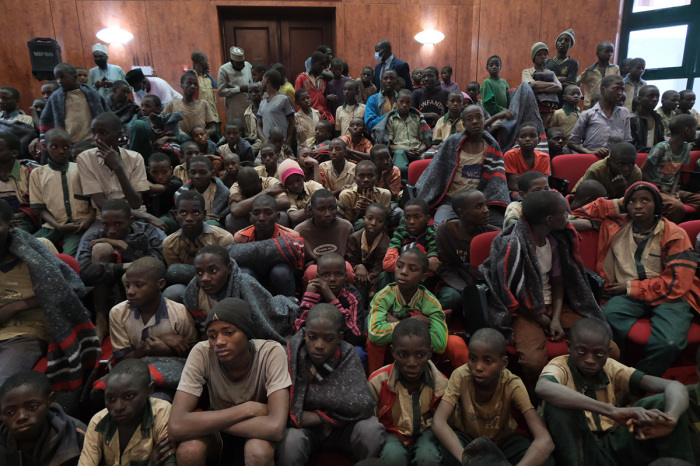Christian group urges Nigerian Pres. Buhari to rescue all Boko Haram captives after freeing 344 boys

A persecution watchdog group is urging Nigerian President Muhammadu Buhari to rescue the boys who are still being held captive by Boko Haram after security forces rescued 344 of the kidnapped students in northern Nigeria late Thursday.
On Dec. 11, the jihadists captured an unknown number of boarding school students — possibly as many as 500 — from Kankara Government Science Secondary School in Kankara, Katsina state. Boko Haram claimed responsibility for the attack.
“They commanded the crowd like a herdsman herd the sheep,” Hassan Abdul-Bashir told CNN. “They shot the policeman guarding our school. I saw them driving many students. There could (be) as much as 200 students, but I am not sure.”
The terrorists released a six-minute ransom video featuring Boko Haram's black-and-white flag and showing a large crowd of boys in the forest surrounded by masked gunmen. As one of the boys speaks to the camera, music plays in the background.
“Please, sir, you have to send all the soldiers and armies and the jets back,” says one boy, according to The Wall Street Journal. “You have to close any kind of schools excluding Islamiyah,” he says, referring to Islamic schools. “Please, sir."
Security forces rescued the boys without fighting the jihadist group. Not all of those captured have returned, however, but it remains unclear if they are dead or still being held captive.
The attack bears similarities to the kidnapping of the 276 Nigerian schoolgirls in 2014 which gained international attention with the #BringBackOurGirls campaign, executive director of Save the Persecuted Christians, Dede Laugesen, told The Christian Post. It indicates that Boko Haram has expanded from northeast Nigeria to the northwest.
In 2014, over 276 schoolgirls were kidnapped by Boko Haram in the town of Chibok in Borno state. Over 112 remain missing.
“As the mother of six boys, I watched that [hostage] video from the eyes of a mother. I thought about the parents who were grieving the loss of their sons," Laugesen said. "To look at the face of those boys, their faces were just. … I’m emotional thinking of these boys in the forest with terrorists surrounding them, not sure if they’re going to come home.”
Boko Haram grooms the boys it captures to become terrorists, Laugesen said. In some cases, the group forces children as young as 8 years old to execute Christians.
“[Children are] used as assassins. They call them the ‘cubs of the caliphate.’ Up to 10,000 boys have been taken by the terrorists,” she said. “They would have been taken off into the forest and brainwashed to become terrorists themselves. Orphans [and] abandoned children are ripe for the picking of terrorists.”
Boko Haram’s opposition to education creates a vicious cycle that leads to more terrorism, said Laugesen. Children fear to attend school because terrorists attack education centers. Without education, they can’t get jobs to provide for themselves as adults. Jobless, uneducated young adults often become terrorists.
Nigeria’s government often lets terrorist groups operate unopposed, she said. Nigeria receives lots of international money to help it fight terrorists. Keeping them around means more cash in the hands of its leaders.
Rather than fighting radical jihadist groups like Boko Haram and radical Islamic Fulani militants, the Nigerian government tells the world that killings and kidnappings happen for reasons other than terrorism. Western media and governments like to believe this narrative because they prefer narratives where Islam doesn’t motivate violence, she said.
Nigeria’s Muslim President Muhammadu Buhari and his Muslim-staffed administration have repeatedly said that Boko Haram is “mostly defeated.” But in 2020 alone, radical Islamist groups, including Boko Haram, have killed 2,200 people.
After Boko Haram kidnapped the boys, the Nigerian government said the attack came from bandits, not Boko Haram terrorists, CNN reported.
“What you have is a situation where the government fails to arrest or prosecute any of these terrorists. They frequently put out propaganda, and misinformation that the violence in Nigeria is put out by [clashes between farmers and herders], or lawlessness and banditry,” Laugasen said. “This is a way to distract the populace from these terrorists who have not been defeated. To save face, the government calls [terrorism] banditry and chaos.”
Nigeria’s government probably saved the boys quickly for three reasons, she said.
Firstly, Muslim cultures value boys more than girls, so the Muslim-led government prioritizes saving them. Furthermore, the kidnapping happened in Buhari’s home region. Failing to respond would make him look weak, Laugasen said. Finally, the school that Boko Haram raided taught the children of several Nigerian leaders.
Several boys remain missing. It remains unclear whether Boko Haram killed them or is still holding them captive, Laugasen said. Boko Haram often refuses to set free Christian prisoners. Three years after her kidnapping along with over 100 other girls, Boko Haram still holds 17-year-old Leah Sharibu prisoner because she will not give up her faith in Christ. Nigeria’s government often leaves some prisoners behind with the terrorists when it negotiates prisoner releases.
“[Boko Haram] kept Leah because she refused to renounce the Christian faith. This is the ideology of those who have taken these boys,” she said. “Until we know how many boys have been taken and how many have been returned, we cannot know all the boys are safe.”
To help Christians in Nigeria, believers around the world can pray for them, Laugasen said. Christians can also write letters to their government representatives to demand the end of the Nigerian genocide.
“We stand with [the boys’] parents and insist that the Nigerian government bring all the boys home,” she said.





























